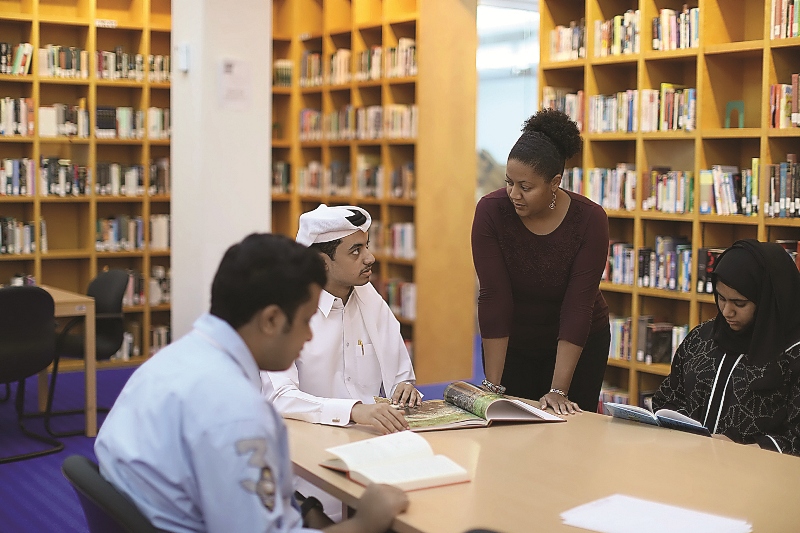

By Fazeena Saleem
The Academic Bridge Program (ABP) of Qatar Foundation is celebrating its 15th year of preparing young Qatari men and women for a successful future in university and beyond.
The centre is determined to create opportunities for students and helping to prepare them to become valuable contributors to the future of Qatar.
ABP is a premier pre-university program established for high school graduates from Qatar and other countries in the region. It aims to be the pre-eminent Post-Secondary Preparatory Program in Qatar and the Gulf Region and to equip specially selected, top-calibre secondary school graduates for admission to and success in degree programs at the universities at Qatar Foundation and other English-language world-class universities.
Among its more than 2,500 alumni, many have enrolled at one of the universities in Education City, at Qatar University or at universities in the US or the UK.
The centre shares ample of success of students who managed, not only to make their dreams a reality by gaining admission to a top ranking, competitive university, but who also flourished in that university.
Omar Al Emadi, ABP’s graduate of the Class of 2013, is a very good example of this. Al Emadi was accepted in three of the Hamad bin Khalifa University partner universities in Education City: Texas A&M at Qatar (TAMU-Q); Georgetown University (GUSFS-Q), School of Foreign Service in Qatar; and Carnegie Mellon University in Qatar. He is currently studying at Carnegie Mellon (CMU-Q) and has succeeded to stay on the CMU-Q Dean’s List, since his freshman year.
“Taking a cross registration course while being in ABP allowed me to personally experience the academic aspect of University,” says Al Emadi. He explains that taking that one course before actually enrolling in university “opened his eyes” and prepared him for a university work load.
“Calculus 1 was a piece of cake in CMU thanks to ABP,” he added.
Among ABP’s alumni approximately 2,000 (80 percent ) have been Qatari and about 500 (20 percent ) have been non-Qatari. The ABP currently has about 160 students. Of these 160 students, about 80 percent are Qatari and about 20 percent are non-Qatari.
All students at the ABP take courses in Computers, Math, English, and Science. It offers courses in each of these subjects at a number of different levels. Our Computer Curriculum, for instance, includes Essential Computer Skills, Intermediate Computer Skills, Advanced Computer Skills, Programming, and Robotics.
“As you know, the mission of the Academic Bridge Program is to prepare our students for success at the university level. Last year, the ABP Class of 2015 was the most successful graduating class in the history of the ABP, in regards to university admission offers. Fifty-seven percent of those students who applied to EC universities received acceptance to at least one institution, and over 30 percent of last year’s graduates were accepted to other excellent universities in the UK, US, and throughout the world,” said Dr Bryan K Lewallen, Director of ABP.
Speaking about ABP’s future endeavours Dr Lewallen said: “The Academic Bridge Program never sleeps, we are constantly looking for ways to continue improving what we offer to our students, both academically and in the area of extracurricular activities,” he added.
The Academic Bridge Program has also expanded the number of agreements (Memoranda of Understanding) with universities in the UK. These agreements allow ABP graduates, who meet the universities’ minimum requirements, to enter directly into ‘Year One’ without repeating a Foundation Year. This is a huge benefit to our students who wish to study in the UK. The latest Memorandum of Understanding was signed in January 2016 with City University London (CUL), soon to become a part of the University of London. This agreement will offer our ABP graduates a wide variety of degree options in many different areas. The ABP also has agreements with over 20 additional institutions in the UK, US and Germany.

Students come to the ABP with a variety of strengths and interests. The ABP builds on these strengths and interests and fills in gaps in both knowledge and skills. A key focus of the ABP is developing the so-called soft skills that are so important to success.
“The ABP is neither a school nor a university. Rather, it is a bridge between high school and university. On that bridge, students acquire the knowledge and develop the skills that will help them to be more competitive applicants to university and a more capable students in university,” said Dr Mark Newmark, Assistant Director for Academic Affairs of ABP.
“Those soft skills include communication skills, critical thinking, problem solving, how to work independently, how to work effectively in a group, study skills, and how to identify their needs and to get the help and support that will enable them to be successful. The ABP helps students develop these skills through a well-developed curriculum, a student-centred approach, and a talent and committed group of faculty and staff,” he added.
The Peninsula




